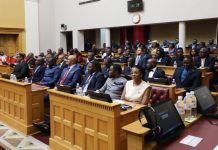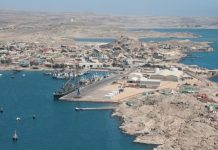17 July 2024
By Josá Markowitz, The Namibian
Experts say a strong local content policy can help attract foreign investment, while ensuring Namibians get a fair share of the country’s resources.
This was discussed at the Namibia Chamber of Commerce and Industry’s (NCCI) Namibia Business Symposium on fostering industry collaboration, held at Walvis Bay earlier this month.
Held under the theme: ‘Championing Namibia’s Local Content for Diversity, Inclusion and Sustainable Economic Growth’, the week-long event featured interactive discussions on critical topics.
Jason Kasuto, managing director of Monasa Advisory and Associates and chairperson of the Economic Association of Namibia said the central focus of the symposium was a panel discussion titled ‘Advancing Namibian Local Content Policy: Inputs and Perspectives’.
Kasuto emphasised the significance of a robust local content policy in ensuring Namibian citizens equitably benefit from the nation’s natural resources.
He referenced articles 99 and 100 of the Namibian Constitution, underscoring the need to balance attracting foreign investment with maximising domestic advantage from resource exploitation.
“The local content policy establishes a framework for stakeholder alignment. However, a targeted implementation strategy is crucial to operationalise the policy’s objectives. While policy issuance is a necessary catalyst, effective execution is paramount,” Kasuto said.
Meanwhile, Halliburton Sub-Saharan Africa vice president Antoine Berel proposed the term ‘in-country value creation’ as a guiding principle.
Berel outlined Halliburton’s commitment to maximising in-country value for Namibians throughout their operations.
Chairperson of the public affairs committee of the Namibia Petroleum Operators Association Maria Mbudhi highlighted the need for improved policy coherence across government entities and addressed challenges faced by oil and gas operators.
She pointed out inconsistencies between the duration of oil block licences issued by the Ministry of Mines and Energy and the validity periods of work permits for foreign specialists.
Joao Tiago of Schlumberger presented his company’s initiatives to empower the local workforce, including international training programmes for graduates and partnerships with Namibian universities.
Knowledge Ipinge, acting managing director of Operatec Maritime and Industrial Training College, highlighted their efforts to equip Namibians with essential oil and gas sector skills.
The conversation extended to addressing the funding needs of small and medium enterprises (SMEs) seeking to participate in the oil and gas sector.
Fillemon Hamutenya of Ino-Harith Capital discussed their strategic partnership with Modena, a prominent Nigerian private equity firm, to bridge the funding gap for Namibian SMEs venturing into oil and gas.
Hamutenya said the Namibia Business Symposium culminated with a presentation on opportunities within the blue economy, followed by a summary of key takeaways and recommendations for charting a path towards sustainable economic growth.






